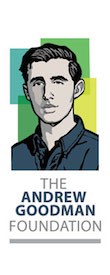
They were remembered this July 4th weekend by Vice President Joe Biden. Addressing a crowd at Independence Hall, Biden said he is reminded of two Philadelphias, the Philadelphia where the United States was born 238 years ago and the Philadelphia in Mississippi where civil rights workers were killed.
"Civil Rights Act workers, Goodman, Chaney and Schwerner were murdered in that small town, while attempting to give that cherished phrase all men are created equal meaning, to give it some life."
Two weeks later the Civil Rights Act of 1964 was born.
“The Jewish Community has a special relationship with the Civil Rights Movement and the Voting Rights Movement."
Stosh Cotler is with Bend the Arc. It's a progressive organization for justice. She spoke at a recent NYC gathering organized by the Andrew Goodman Foundation which looked at the legacy of Goodman, Chaney and Schwerner. She says hers is the only Jewish organization which was asked to speak at the 50th anniversary of the March on Washington in D.C.
“Our former CEO, Alan Van Capelle was able to give a speech at that time. And when he was leaving the stage, an older African-American woman reached out to him and touched him on the arm and said, I didn’t think the Jews cared anymore."
For progressive Jews, Cotler says its sad that this has become more of the dominant story about the Jewish community, that Jews don’t care. But Cotler says the Jewish community never left this fight.
"The challenge has been that our Jewish communal institutions since the 1980's have become increasingly more conservative, politically much more moderate and have become almost exclusively focussed on Israel and foreign policy. And what that means is there becomes a narrative about what Jews care about and it's not that we care about these issues, it's that we care about one particular thing and that we're not present. And I just want to say that this is just not true."
Cotler says it matters to have multi-racial coalitions for everything. It matters to have faith-based leaders who are speaking in a language which turns political problems into ethical and moral challenges, because that’s the way to move hearts and minds and to move people who have become cynical and don’t think politics work.
Linda Sarsour with the Arab American Association of New York said when she thinks of Goodman, Schwerner and Chaney what comes up for her is courage—courage and risk. And 50 years later she tries to think about progress—progress as a country and progress here in New York City.
"When we think of the most segregated schools in the country, they're not in Alabama or in Mississippi. They are right here in New York City. When you think about policies that target black and brown communities, they're not in Mississippi or Alabama or Georgia. They are right here in New York City with our New York Police Department policies like stop-and-frisk. And no stop-and-frisk did not stop because you have a new commissioner named William Bratton, who actually was the architect of stop-and-frisk back in the 90's when he was here with us for a very short time. We also live in a city where the New York Police Department believes that every Muslim in the city is a potential terrorist and has an unwarranted spying program. That is not the progress where we should be sitting idly back."
Sarsour is a Muslim woman from Brooklyn with many causes she cares about. She says the organizing work she does comes from a place of dignity.
“Whether you look at the Civil Rights Movement, the Women's Suffrage Movement, LGBT Rights Movement, we’re not asking for favors. We're asking for things we should already have or already deserve.”
She says there aren’t many who are willing to take the same risks that the civil rights workers took 50 years ago.
"When we talk about what Andrew was trying to do around Freedom Summer, we are passing voter ID laws in 20 states, maybe more, which are limiting the access of people right now in 2014 to vote. We are taking away the right for a woman to choose. These are fights we thought we already had and we already won. We're just revisiting. It's like our country is going backwards. And I think the reason that's happening is because there is a lack of courage."
Hopeless people don’t take risks to bring justice to change the world. Sarsour says you need hope, hope that our communites and our country could be better.